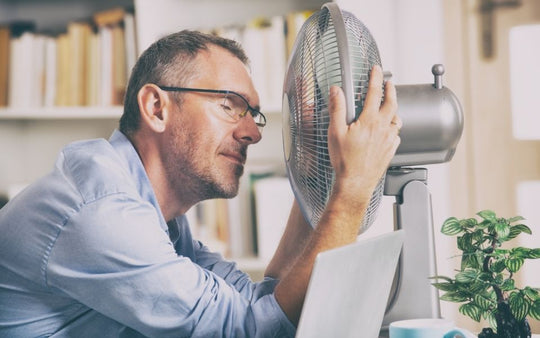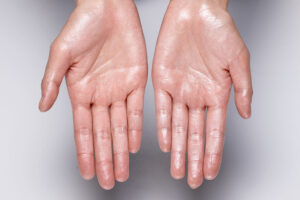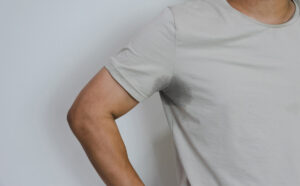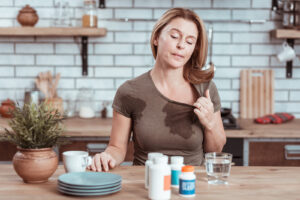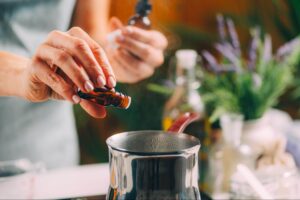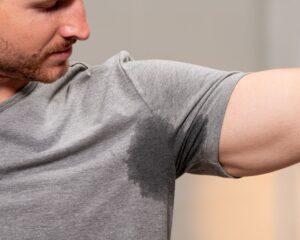Table of Contents
For most people, sweating is a totally natural bodily function. For others, it’s a nonstop nightmare.
Excessive sweating is embarrassing, uncomfortable, and annoying. It can leave you feeling anxious about being around other people.
If you’re part of the unlucky population of people who suffer from excessive sweating, you probably just want to know how to make it stop.
Maybe you’ve already tried a few things that didn’t work, and you’re looking for alternatives.
Perhaps you’re wary about the chemicals in traditional treatments.
Maybe you’re an avid DIYer looking to save some money by self-treating.
The thing is, sweating is a natural process, so it’s completely normal to want a natural solution.
However, when you start researching, it’s hard to know which things are worth your time and which are totally bogus.
So, let’s get into how to stop sweating naturally. We’ll go through all the advice, tips, and tricks for naturally treating excessive sweating.
From straightforward life hacks to bona fide home remedies, we’re covering it all.
Identify the Root Cause
You can’t talk about natural treatments without talking about the root causes.
Naturopathic Doctor from the Institute of Natural Medicine, Amy Rothenberg, NP, says, “[The goal of Naturopathic doctors] is to uncover and help heal the root causes of illness. In doing so, they facilitate the natural healing ability in patients, so that symptoms can be alleviated naturally.”
Wait, hold on, illnesses? We’re just talking about sweating here, right?
If you find yourself sweating nonstop or perspiring for no reason, and exasperatingly asking, “Why do I sweat so much?”, you’re probably part of the 4.8% of the population that suffers from a medical condition called hyperhidrosis.
Hyperhidrosis is just doctor speak for excessive sweating.
So, technically, excessive sweating is an actual medical condition.
Regardless of whether you’re an advocate for natural medicine or not, there’s no arguing that knowing what’s causing your excessive sweating could be the key to making it stop.
Sometimes hyperhidrosis has a cause, like diet, medication side effects, or an underlying medical condition.
In those cases, treatment is as simple as changing your diet, switching up medications, or treating the medical condition that’s causing the sweat.
Other times, though, there’s no root cause at all. It’s just the hyperhidrosis. If there’s no root cause, is it still possible to treat?
Yes, and here’s a few ways to tame those overactive sweat glands without medications, needles or prescriptions.
Sweating Hacks : Daily Tips to Control Sweat
So, we’re going to start by diving into some simple lifestyle hacks. While these aren’t necessarily treatments, they’re solutions that can offer some relief.
Sweating Hack #1: Choose Your Foods Wisely
You are what you eat, right? Avoiding certain foods, eating others, and changing up your diet could nip your excessive sweating in the bud.
Avoid Sweat Triggers (Foods that make you sweat)
Experts agree that the capsaicin in spicy foods can trigger sweat; studies have also shown that caffeine can increase sweating.
Alcohol, meats, salt, and fatty processed foods can also increase the sweat flow for some people. Try cutting out these known triggers.
Eat Foods that Promote Regular Sweating
There haven’t been any studies done that directly link any food to sweat reduction; however, there are several foods whose properties present the potential for sweat reduction.
For instance, hydration is critical to maintaining body temperature. So, it’s fair to assume that if your body doesn’t have to work as hard to regulate its internal temperature, you’ll sweat less.
Fruits and vegetables have tons of water. Cucumbers, for example, are 96% water! So, in addition to drinking more water, add in fruits and vegetables to increase your body’s overall hydration.
Calcium is a critical mineral for maintaining body temperature. So, calcium-rich foods, like low-fat yogurt, almonds, or green leafy veggies can help ensure you’re getting enough of this necessary body-temperature-regulating mineral.
Also, the body’s energy usage increases by 25% while it’s digesting a big meal. That increase in energy can raise your body’s core temperature, which can lead to excess sweating. Try incorporating more fiber-rich foods into your diet to aid in digestion.
Try Specialized Diets
Just right off the bat, if you’re overweight or obese, it could be significantly contributing to your sweating. We aren’t going to make you feel bad like your doctors do, but going on a diet to lose a few pounds could be the trick you need to stop the sweating.
Also, a recent study suggests that a gluten-free diet could eliminate excessive sweating. The patient in the study had Celiac Disease, a digestive disorder that is aggravated by the consumption of gluten.
When she eliminated gluten, her night sweats stopped completely. An estimated 3 million people in the U.S. have Celiac Disease, and 97% of them are undiagnosed.
Approximately 18 million Americans are gluten intolerant (which is not as severe as Celiac Disease, but still results in a digestive intolerance to gluten).
According to this research, if you have an issue with gluten, trying a gluten-free diet could help eliminate your sweat problem.
Sweating Hack #2: Wardrobe Tips
File this one under “a hack to hide the sweat,” because your clothes are obviously not going to stop the sweat. However, making some simple wardrobe swaps can lessen the burden of excessive sweating.
Choose breathable fabrics, like cotton and linen. Look for moisture-wicking clothing. They even have sweatproof undershirts widely available to block the sweat from reaching your outer clothing.
Opt for sleeves with large armholes and flowy bottoms whenever possible. Also, to conceal sweat, choose darker fabrics over lighter ones because it’s harder to see the sweat and staining on dark clothes.
Also, always bring a change of clothes with you. Just keep a bag packed. That way, if you’re ever in a situation where you’ve noticeably sweat through your clothes, you can sneak off and change.
While we’re on the topic of a semi-obvious-but-still-worth-mentioning hack, be sure to bathe regularly. Hygiene is really important to keep the body odor from all that sweating in check.
Sweating Hack #3: Stay Cool, Stay Dry:
Do what you can to stay cool. Clearly, this is easier said than done, but there are several ways to reduce your internal temperature without stepping inside a freezer.
Munching on ice or cold foods can quickly cool you down. Also, applying something cold to certain parts of your body can reduce your internal temperature.
Your wrists, chest, neck, and temples all have veins close to the surface of the skin. If you apply cold water or ice packs on these areas, it reduces the temperature of the blood flowing through those veins, thereby reducing your overall temperature.
The back of your neck is the most effective area for a quick cool. You can use an ice water-soaked towel, or commercially available neck cooling packs to drape around the back of your neck for a quick cool down.
In your home, keep your thermostat at a reasonable temperature, and if possible, keep your window curtains closed.
Since most people struggle with night sweating, do your best to cool down your bedroom. Try adding a fan, a cooling pillow, and breathable sheets to make your bedroom cooler.
Sweating Hack #4: Relax
There’s a reason that people always ask you if your nervous when you’re battling a sweat episode. Roughly 24-32% of people with social anxiety disorder also have hyperhidrosis.
When we’re stressed, our body enters a fight-or-flight mode, and your body responds by making you sweat.
Work on easing the stress in your life. Practice scientifically-backed relaxation techniques like yoga and meditation and consider talk therapy.
Alternatively, you can try some more nonconventional stress reduction techniques like hypnosis or aromatherapy.
Sweating Hack #5: Sweat Absorbing Products
The slightly comforting news here is that you aren’t alone. Because there are roughly 15 million people with hyperhidrosis in the U.S., there are several products available on the market to aid you in your sweat problem.
For underarm sweating, try underarm sweat pads (also called underarm liners or underarm shields). These sweat pads can attach right to your armpit or shirt and absorb excessive sweat.
For sweaty feet and stinky shoes, you can use absorbent, cooling, washable, or odor-blocking insoles. Each of these types of insoles provide their own self-explanatory benefit.
Body powder is also a go-to solution for many sweaters. It not only absorbs sweat, but most body powders also neutralize odors, making powder an excellent solution for all the cracks, crevices, and folds where applying deodorant isn’t ideal.
Alcohol is also a commonly used method for drying up sweat. (No, not that kind of alcohol, the isopropyl, rubbing alcohol that you can buy without an i.d.).
Alcohol dries your skin, so alcohol wipes are a quick solution to dry up sweaty palms or pits in a pinch.
Home Remedies for Excessive Sweating
Alright, before we get started here, we have to say the following (Forgive us. We know it’s irritating).
Disclaimer and warning: Talk to your doctor about home remedies. Natural remedies may or may not work and are not clinically proven to treat hyperhidrosis.
This content is general advice and doesn’t substitute for a qualified medical opinion.
Okay. Now that that’s out of the way, let’s jump in.
Vitamins for Sweating
Before we get started on Vitamins, be aware that the supplement industry is highly unregulated.
Beth Kitchin, a registered dietitian and an assistant professor in the University of Alabama at Birmingham’s Department of Nutrition Sciences, says, “A lot of consumers don’t realize that the FDA does not regulate dietary supplements like multivitamins/minerals and herbal supplements before they go to market.
Supplements can be contaminated with dangerous ingredients like lead or pharmaceutical drugs. In some supplements, the amount of the nutrient stated on the bottle is not the amount actually in the bottle.”
So, just make sure you’re getting supplements from a trusted source and talking to your doctor beforehand. Okay, off our soapbox. We just care about you, okay?
- B Vitamins: Nutritionist Rick Hay says, “B vitamins help keep hormones regulated and keep stress levels under control.” B vitamins might help your hyperhidrosis if hormones or stress are causing your sweating.
- Magnesium: We naturally lose magnesium when we sweat. Low magnesium can lead to stress, which leads to more sweating and more magnesium loss. Taking magnesium supplements could help keep your magnesium levels balances, in turn curbing sweat production.
- Calcium: As we already mentioned, calcium helps regulate body temperature. Additionally, if you’re taking magnesium, you’ll need calcium to improve your body’s ability to absorb the magnesium.
- D Vitamins: Excessive sweating can be a sign of a vitamin D deficiency, especially if most of your sweat is from your head. Around 1 billion people worldwide have a vitamin D deficiency. A quick blood test from your doctor can confirm D levels in your body. If you’re deficient, D vitamins could be worth a try.
- Vitamin C: Proponents of detoxification argue that sweat is the body’s mechanism for detoxification, so if you sweat excessively, you’re dealing with excess toxins.
(Now, we can’t find any medical journals or studies to support the excess toxins and detoxification theory, but it’s a well-documented belief in the naturopath community). Some people believe that vitamin C can aid in the detoxification process.
Herbs for Sweating
Before we dive into herbs, it’s worth noting that herbs can have some severe side-effects. They can counteract medications, cause allergic reactions, digestive distress, increase blood pressure, and more.
In his book, Herbal Medicine: Biomolecular and Clinical Aspects, 2nd edition, Philip D. Shenefelt. MD, a board-certified dermatologist, presents troves of scientific and anecdotal evidence supporting the use of herbs for various medical conditions.
However, he also notes the side effects. Please be aware that “herb” doesn’t automatically mean safe.
Sage: The European’s FDA equivalent, the German Commission E. officially acknowledges the use of sage as an effective hyperhidrosis treatment. It can be taken internally via capsules and tinctures, drank in a tea, or applied topically through a sage soak. Sage works because of the tannic acid found in sage, which is suspected to constrict the sweat glands. It’s also an anti-bacterial, which decreases the growth of odor-causing bacteria.
Chlorophyll: Yeah, the stuff inside plants that help with photosynthesis (Having high school biology flashbacks?). Chlorophyll doesn’t stop sweating, but advocates claim that chlorophyll eliminates body odors by acting as an internal deodorant, eliminating the smell from things like bad breath, urine, and sweat. There’s limited research on its anti-odor effects.
Witch Hazel: Witch Hazel is an astringent, which means that it dries your skin and closes pores. Smaller pores mean smaller pathways for sweat to release from your body. Witch hazel is applied directly to sweaty areas as needed.
Aloe Vera: Aloe vera gel, the stuff you use for sunburns, is also touted as a remedy for excessive sweating. Aloe vera gel cools the skin, which helps to decrease body heat. Applying aloe vera gel to hot spots, like your armpits, forehead, or palms, temporarily cools the skin down, dissuading sweat production.
Wheatgrass: Wheatgrass is packed with tons of vitamins, including B6, B12, and vitamin C, which are all used alone as hyperhidrosis treatment. Wheatgrass also contains chlorophyll. So, in a lot of ways, wheatgrass is just a combination of many of the other recommended remedies on this list. Many people add wheatgrass to their juices or smoothies.
Schisandra: This herb is used in Chinese medicine to treat night sweats, especially in menopausal women. It’s might also help kidney function and balance bodily fluids, thereby decreasing daytime sweating.
Black Cohosh: This herb is used in the herbalist community to decrease the symptoms of menopause, including excessive sweating. One medical study found that menopausal women who took black cohosh had fewer and less severe hot flashes when compared to treating with other herbs.
St. John’s Wort: Like black cohosh, herbalists and naturopaths prescribe St. John’s Wort to alleviate menopause and hormonal symptoms. It’s also a known remedy for anxiety. So, it’s a double whammy, if you’re hyperhidrosis is caused by hormones or anxiety, St. John’s wort, could be worth a try.
Valerian Root: Valerian root is commonly referred to as nature’s valium. It’s beneficial in treating anxiety and decreasing menopausal symptoms.
Essential Oils: Several essential oils claim to combat excess sweating including, tea tree oil, lavender, citrus oils (like lemon, lime), peppermint, and pine.
Some of them work as an astringent. Others work as cooling agents. And others are just odor blockers.
Apple Cider Vinegar: ACV provides several benefits. When you apply it directly to sweaty areas, it kills standing bacteria and eliminates odor.
It also dries and soothes the skin, while closing the pores. When taken orally, AVC might also balance pH levels in the body, which could dissuade excess sweat. You can add a couple of tablespoons to a glass of water each morning to try this method.
Teas Some teas contain high levels of tannic acid, making them a powerful antibacterial and pore reducer. Sage tea, black tea, and chamomile tea are all examples of these types of teas.
To treat using tea, throw a few tea bags into a basin of hot water and soak your hands and feet.
Tomato juice: Tomatoes are highly acidic, and drinking tomato juice can lower your body’s internal temperature and shrink your pores. Some people also advocate for the direct application of tomato juice to sweaty areas.
Apply it and leave it for ten minutes and then rinse it off. If nothing else, we know tomato baths mask the stench of skunk spray, so if they can hide the smell of a skunk victim, your pits shouldn’t be a challenge.
Cornstarch & Baking Soda: Both of these work as absorbents. They’re like natural deodorants that absorb your sweat. Baking soda also neutralizes odors. Many natural health gurus recommend combining the two in a mixture to create a DIY antiperspirant and deodorant combo.
Lemons: Lemons are highly acidic, which makes them a popular natural remedy for sweating. They eliminate bacteria and possibly close pores. To use this remedy, you’ll want to apply lemon juice directly to your sweaty areas, and let it sit for around half an hour before rinsing.
Potatoes: This one sounds like an old wives’ tale, but experts argue that potassium-rich foods like potatoes help pull water out of the body.
To use this remedy, you slice a potato and place it under your armpits, on your feet, or in your palms for several minutes to allow the potato time to soak up excess moisture.
Coconut Oil: Coconut contains an ingredient called lauric acid, which is an anti-bacterial, so when you apply it to your skin, coconut oil can help fight odor. Be careful not to use too much though, as it can stain clothing.
Other Natural Sweating Treatments and Therapies
Acupuncture: Acupuncture is a Chinese practice that involves inserting thin needles into various spots in the body.
According to a piece published in Acupuncture in Medicine, acupuncture is particularly helpful in treating focal hyperhidrosis, or hyperhidrosis that doesn’t have a known cause.
Additionally, according to a piece published in the Journal of Chinse Medicine, professional acupuncturist and chiropractor, Brett Martin, found that patient’s treated with acupuncture experienced a 70% reduction in symptoms in the first few weeks following treatment, and they maintained a 40% reduction in symptoms a month later.
Biofeedback: Biofeedback is a type of therapy that aims to teach you how to control automatic bodily functions, like heart rate, breathing, and blood pressure.
During training, therapists apply sensors to your body that react when a normal physiological response takes place. Through therapy, you learn how to control these natural bodily functions.
Biofeedback is used in all types of disorders, ranging from emotional disorders to pain management to urinary incontinence.
A study completed in 1980 found that roughly 79% of patients were able to improve their hyperhidrosis over six weeks using biofeedback therapy.
Homeopathy: If you aren’t familiar with homeopathy, it’s an alternative view of medicine founded in 1796.
It suggests that your body can heal itself of any disease by exposing the body to substances that produce similar symptoms to the condition you’re trying to treat.
Almost all traditional medical and scientific experts believe that homeopathy is pseudoscience (a.k.a totally bogus).
However, if you’re into it, homeopathic doctors suggest taking sulphur, Calcarea carbonica, silica, lycopodium, or Ignatia remedies.
Dosage depends, but it typically involves taking small sugar pellets with repetitive dosing.
If All Else Fails…
There you have it, all the lifestyle hacks, home remedies, and natural ways to stop sweating. Keep in mind that a lot of the remedies are unproven and theoretical solutions.
Give them a try, sure, but go into it with realistic expectations so that you aren’t disappointed if they fail. Also, always speak with your doctor before trying anything new.
Remember, you aren’t alone in your struggle. There are several treatment options out there, and often, it’s just about finding the one that works for you.
If these natural solutions don’t work as well as you’d hoped, consider trying some of the proven ways to stop excess sweating, like prescription and clinical strength antiperspirants, iontophoresis, laser treatments, MiraDry, Botox, oral medications, or surgery.
You might also like...

Why Do I Sweat So Much? And So Easily?
WHY DO I SWEAT SO MUCH? : ARTICLE CONTENTS Sweating a lot? … when you workout, sleep, after eating, or
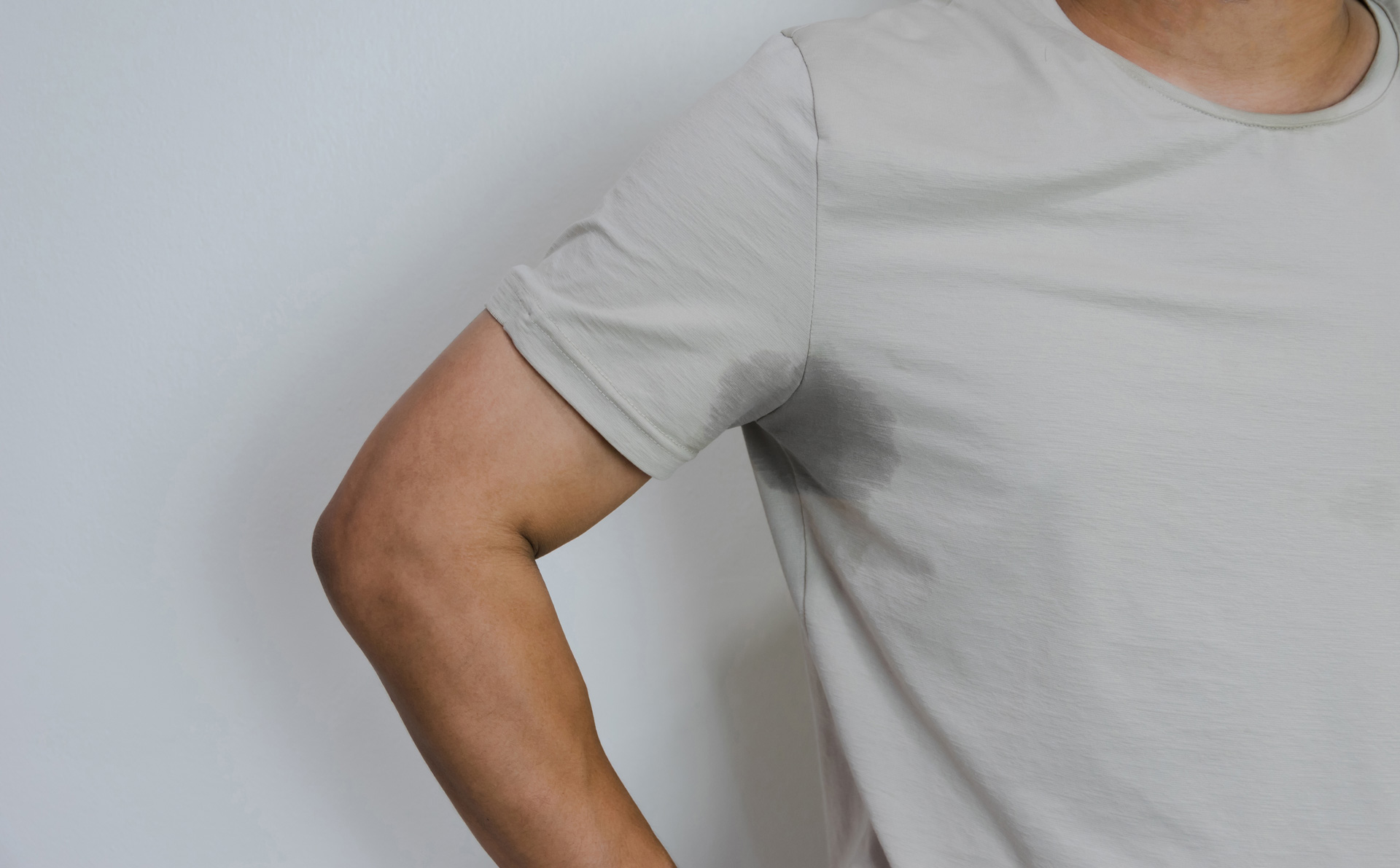
How to Stop Armpit Sweat – 12 Ways to Keep Underarms Dry
Have you ever hesitated to hug someone, raise your hand, or cheer on your favorite team solely because you didn’t

Foods that Reduce Sweat, Tips to Stop Excessive Sweating
Do you sweat too much? If so, your diet may be to blame. In a past blog post, we highlighted which foods




